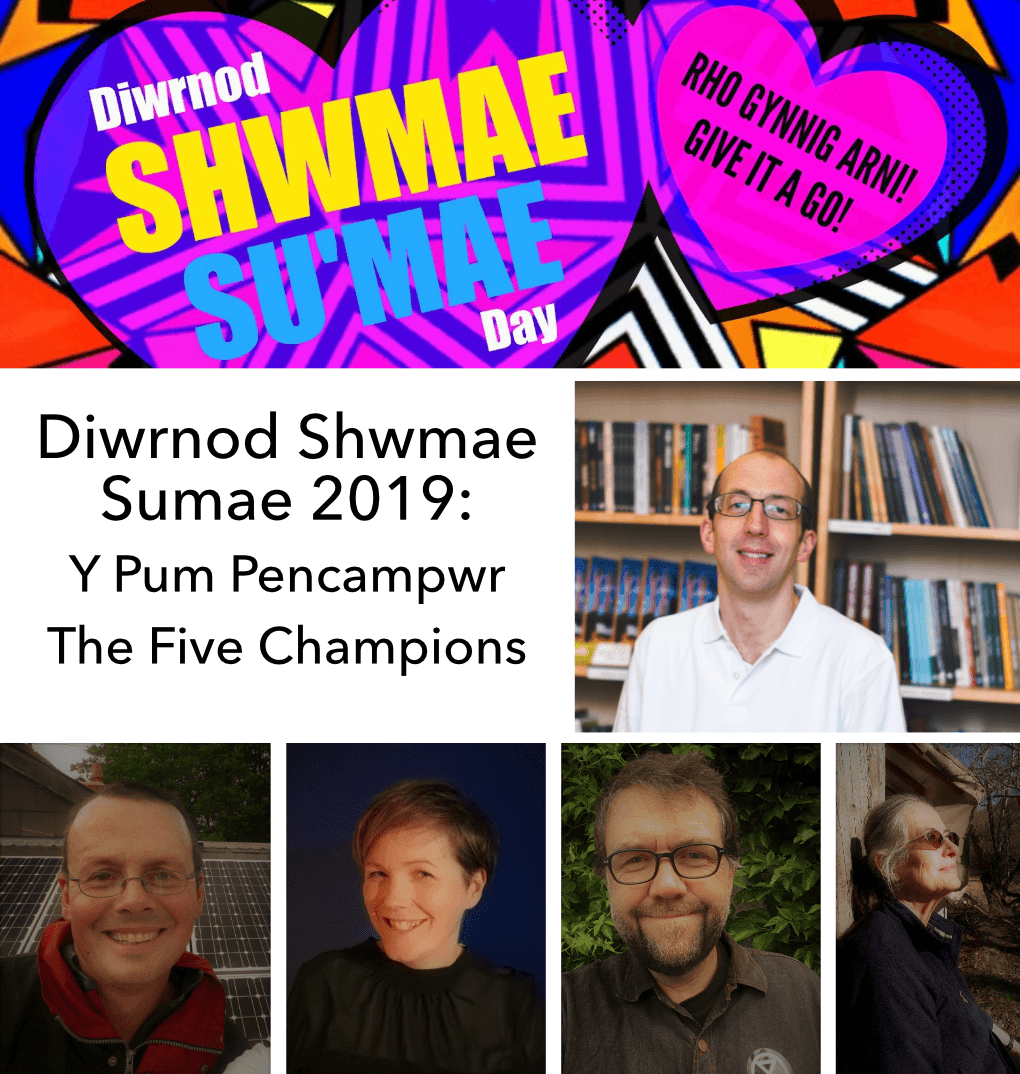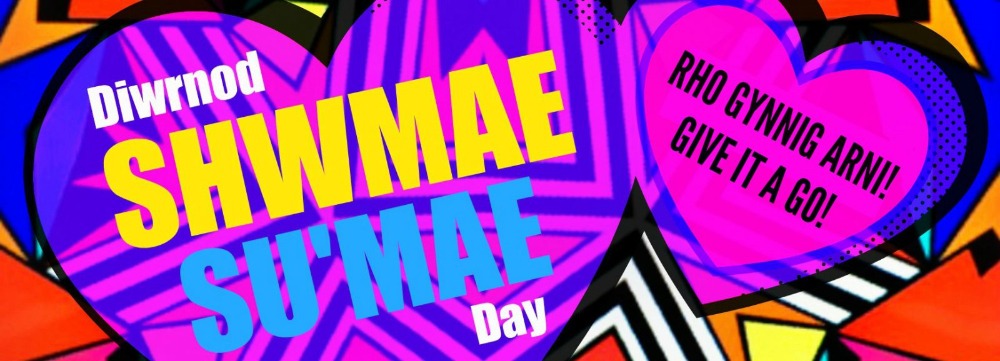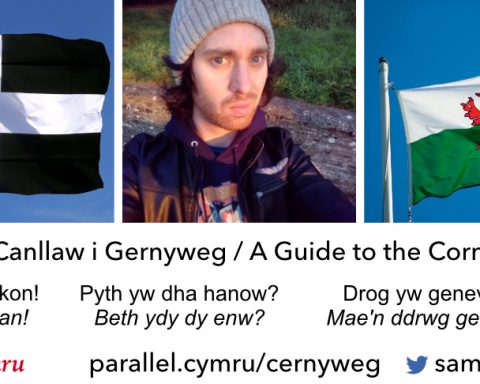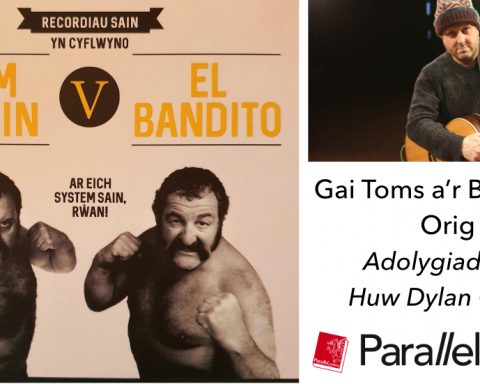Dathlwyd y Diwrnod Shwmae Sumae cyntaf ar Hydref 15ed, 2013 i hybu’r syniad o ddechrau pob sgwrs gyda shwmae, su’mae neu shwdi! Nôd y diwrnod yw dangos bod y Gymraeg yn perthyn i bawb – yn siaradwyr rhugl, dysgwyr neu os ydych yn swil am eich Cymraeg. Mae’r Diwrnod yn cael ei ddathlu pob blwyddyn erbyn hyn ar y 15fed o Hydref.
Dros y saith mlynedd diwethaf, mae ymgyrch Diwrnod Shwmae Sumae wedi bod yn galw ar bencampwyr hyd a lled Cymru i helpu hyrwyddo’r diwrnod cenedlaethol a’i cynhelir ar y 15fed o Hydref bob blwyddyn. Mae’r pencampwyr yma, o bob math o gefndiroedd, yn helpu’r ymgyrch i hybu’r syniad o ddechrau BOB sgwrs yn Gymraeg, a defnyddio ymadroddion syml fel modd o normaleiddio’r iaith, ymysg eu rhwydweithiau a’u cymunedau nhw.
We celebrated the first Shwmae Sumae day on October 15, 2013 to promote the idea of starting every conversation with shwmae, su’mae or shwdi! The event aims to show that the Welsh language belongs to us all – fluent speakers, learners or those shy about their Welsh. The Day is celebrated annually on the 15th of October.
Over the past seven years, Shwmae Sumae Day has called on champions across Wales to help promote the national day of celebrating the Welsh language, held on the 15th of October. These champions encourage the act of starting each conversation in Welsh, and using simple phrases, as a means of normalising the language amongst their networks and communities.
Neil Rowlands
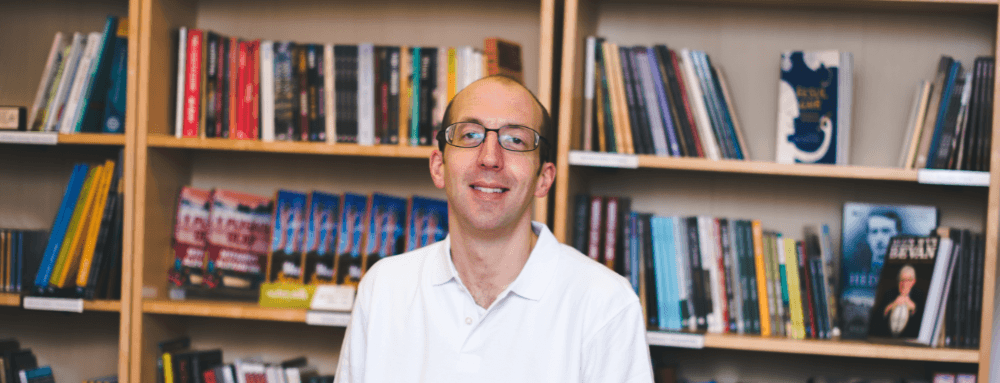
| Bydd pum pencampwr yn cael eu cyhoeddi yn ystod yr wythnos, ac rydym yn falch iawn o gyhoeddi mai Neil Rowlands, yn wreiddiol o Gaerdydd a nawr yn byw yng Nghasnewydd, yw ein pencampwr cyntaf am 2019! Dadansoddydd Data yw Neil, a sefydlwr y cylchgrawn dwyieithog arlein Parallel.cymru – cylchgrawn sydd yn gwneud darllen yr iaith yn fwy hygyrch i ystod ehangach o bobl. | Five champions will be announced during the week, and we are very pleased to announce that our first champion for 2019 is Neil Rowlands, originally from Cardiff, now living in Newport. Neil is a Data Analyst and the founder of the online bilingual magazine Parallel.cymru – a website that makes reading the Welsh language more accessible to a wider audience. |
| "Dw i wedi dysgu Cymraeg yn Abertawe dros y chwe blwyddyn ddiwethaf pan ro'n i'n byw yno. Y cyfle i ddarganfod diwylliant a llenyddiaeth Cymru, a datblygu cannoedd o ffrindiau wedi cael eu galluogi yn unig drwy ddefnyddio'r iaith. | "I've learnt Welsh in Swansea over the last six years when I was living there. The opportunity to discover Welsh culture and literature and develop hundreds of friendships was directly enabled through using the language. |
| "Mae lot o bobl yng Nghymru gyda rhyw fath o brofiad yn yr iaith, ond weithiau dydy ni ddim yn defnyddio'r iaith ddigon. Does dim ots os dyn ni'n iaith gyntaf neu gefndir di-Gymraeg; am yr hen iaith barhaol mae angen amdanom ni ddefnyddio hi cymaint â phosibl- mae'n well cynnal sgwrs gyda thipyn o Gymraeg a rhai geiriau Saesneg na siarad Saesneg yn unig. Fel mae rhywun call wedi dweud, gwell Cymraeg slac na Saesneg slic! | "There are lots of people in Wales with some experience of Welsh, but sometimes we don't use the language often enough. It doesn't matter if we are first-language speakers or from a non-Welsh language background; for the language to continue there is a need for us to use it as much as possible- it is better to hold a conversation with a bit of Welsh and some English words than speak English only. As someone wise once said: it is better to use rough Welsh than smooth English! |
| "Mae'n bwysig dros ben i bobl ar draws y wlad glywed yr iaith ar strydoedd, mewn siopau ac ysgolion, a hefyd arddangos angen defnyddio'r iaith mewn tiliau a pheiriannau arian parod er mwyn creu rhesymau i gwmnïoedd mawr darparu gwasanaethau trwy'r iaith. | "It's very important for people across the country to hear the language on streets, in shops and schools, and also show that there is a need to use the language in tills and ATMs in order to create reasons for large companies to provide services through the medium of Welsh. |
| "Ces i fy ysbrydoli i ddysgu'r iaith trwy glywed lot o bobl siarad yr iaith o gwmpas yr adran Gymraeg ym Mhrifysgol Abertawe. Ar y pryd, ro'n i'n gweithio drws nesaf iddyn nhw, ond roedd e y tro cyntaf i fi sylweddoli bod cymunedau o bobl yn defnyddio'r iaith bob dydd. Hyd yn oed yn well na hyn, roedd yr un gymuned yn gefnogol dros ben i fi fel dysgwr newydd, er ro'n i'n cymysgu geiriau, cam-ynganu termau syml a hollol gamddeall beth roedd pobl yn dweud wrth siarad â fi! | "I was insprired to use the language through hearing lots of people speaking it around the Welsh department in Swansea University. At the time, I was working next door to them, and it was the first time that I realised communities of people use the language every day. Even better than this, the community was very supportive to me as a new learner, even though I was mixing words, mis-pronouncing simple terms and completely mis-understanding what people were saying to me! |
| "Trwy ddefnyddio'r iaith â phobl yn y Brifysgol ac yn y ganolfan iaith Tŷ Tawe, dechreuais i siarad mwy na'r un chwe brawddeg (Neil dw i, dw i'n dod o Gaerdydd, dw i'n gweithio i Brifysgol Abertawe ayyb...). Ymestynnais i fy medr wrth siarad, ac wedyn dechreuais i gyfrannu at y gymuned trwy wirfoddoli yn ac wedyn rhedeg y grŵp sgwrsio wythnosol i ddysgwyr, Siop Siarad, gweithio ad-hoc yn y siop, bod yn bresennol mewn gigiau. Dwy flwyddyn yn ôl, yn fy amser sbâr sefydlais i'r cylchgrawn digidol parallel.cymru er mwyn gwneud darllen yr iaith yn fwy hygyrch i ystod ehangach o bobl. Tu fewn un flwyddyn, roedd e'n derbyn pum mil o ymwelwyr y mis. Mae'r cyfrifoldeb hwn wedi agor y drws i fi gwrdd â channoedd o ddysgwyr a phobl yn y meysydd cyhoeddi a technoleg, cynnal sesiynau yn yr Eisteddfod Genedlaethol a hyrwyddo llyfrau a gramadeg Cymraeg. | "Through using the language with people in the University and in the language centre Tŷ Tawe, I started speaking more than the same six sentences (I'm Neil, I'm from Swansea, I work for Swansea University etc...). I extended my ability through speaking, and then I started contributing to the local community through volunteering and then running the weekly chat session for learners, Siop Siarad, working ad-hoc in the shop, and being present in gigs. Two years ago, in my spare time, I founded the digital magazine parallel.cymru in order to make reading Welsh more accessible to more people. Within one year, it was receiving 5,000 visitors a month. This responsibility has opened the door for me to meet with hundreds of learners and people in the publishing and technology fields, hold sessions in the National Eisteddfod and promote Welsh-language books and grammar. |
| "Felly, tasen i ddim wedi trio dweud Shwmae i fwy o bobl ar y dechrau o fy nhaith dysgu, faswn i ddim wedi ennill yr holl brofiadau na chael y cyfle i rhoi yn ôl i’r diwylliant Cymraeg- ac yn nawr, faswn i ddim yn gallu dychmygu fy mywyd heb yr iaith." | "So, if I hadn't tried to say Hello to more people at the start of my language journey, I wouldn't have earned the experiences nor had the opportunity to give back to Welsh-language culture- and now, I can't imagine my life without the Welsh language." |
Fiona Collins
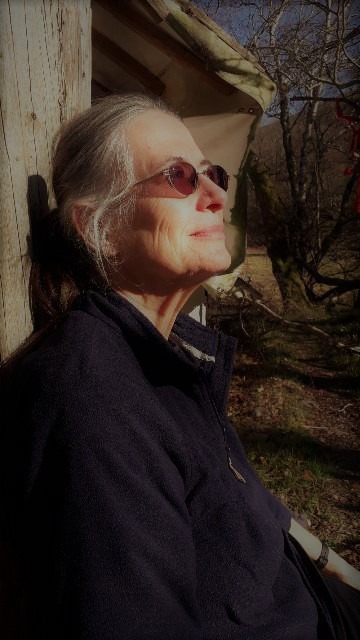
| Rydym yn hynod o falch o gyhoeddi taw ein hail bencampwr am 2019 yw’r Chwedlonwraig ac enillydd cystadleuaeth Eisteddfod Genedlaethol Dysgwr y Flwyddyn, Fiona Collins, yn wreiddiol o Swydd Hampshire yn Lloegr, ac erbyn hyn yn byw yng Ngharrog, Sir Ddinbych. Dechreuodd Fiona ddysgu Cymraeg yn Llundain, cyn parhau i ddysgu mwy pan benderfynodd symud i Gymru. Hiraeth a ddaeth â Fiona i Gymru. Roedd ei mam yn Gymraes o Rymni, nyrs a symudodd i ysbyty bach yn Hampshire ar ôl fod yn gweithio yn Llundain yn ystod yr Ail Ryfel Byd. Roedd gan ei thad dafarn gyferbyn â’r ysbyty bach hwnnw, a dyna sut wnaeth ei rhieni hi gwrdd! Hi yw’r cyntaf o’i theulu i ddysgu Cymraeg. Chwedleuwraig yw Fiona, oedd yn teimlo ei fod yn angenrheidiol iddi allu adrodd chwedlau Cymru yn yr iaith Gymraeg – “chwedlau’r wlad yn iaith y wlad” fel y dwedai. Wrth esbonio pwysigrwydd Diwrnod Shwmae Sumae, a’i rôl hi fel un o bencampwyr y diwrnod eleni, meddai Fiona: | We are very proud to announce that our second champion for 2019 is the Storyteller and National Eisteddfod Welsh Learner of the Year, Fiona Collins, originally from Hampshire, and now living in Carrog, Denbighshire. Fiona began learning Welsh in London, before continuing to learn once she decided to move to Wales. It was ‘hiraeth’ or longing that brought Fiona to Wales. Her mother was from Rhymney, a nurse who moved to a small hospital in Hampshire after working in London during the Second World War. Her father ran a pub opposite the hospital, and that is how her parents first met! Fiona is the first of her family to learn Welsh. She is a professional Storyteller and believes that to retell the stories of Wales, it was essential to have the ability to recount the stories in the Welsh language – “the lands legends through the language of the land” as she explains. Describing the importance of Shwmae Sumae Day, and her role as a champion, Fiona says: |
| “Mae Diwrnod Shwmae Sumae yn annog pobl i ddechrau bob sgwrs yn Gymraeg, a does dim ffordd gorau i godi hyder na defnyddio pob smic o Gymraeg sydd gennoch chi. Dwi’n credu bod pawb sydd yn byw yng Nghymru yn gallu tipyn o Gymraeg. ‘Dan ni i gyd yn deall fod ‘Araf’ ar y ffordd yn golygu ‘lleihau’r cyflymder’, a bod ‘Maes Parcio’ yn rhywle i adael y car! Felly dwi wastad yn annog pobl sy ddim yn Gymry Cymraeg i beidio dweud ‘Dydw’i ddim yn siarad Cymraeg’, ond yn hytrach dweud, ‘Dwi’n siarad tipyn bach o Gymraeg’. Fel hyn, maen nhw’n cydnabod y Gymraeg SYDD ganddyn nhw, hyd yn oed os dim ond ‘Cymraeg arwyddion y ffordd’ yw hi.” | “Shwmae Sumae Day encourages people to start each conversation in Welsh, and there’s no better way to give people confidence than by encouraging them to use every single word that they possibly can. I think everybody in Wales has a little bit of Welsh. We all know that ‘Araf’ painted on the road means slow down, and that ‘Maes Parcio’ is somewhere to leave your car! So, I always encourage people who aren’t Welsh speakers not to say ‘I don’t speak Welsh’, but rather to say: ‘I speak a little bit of Welsh’. In that way, they can acknowledge the Welsh that they DO have, even if it is only ‘road sign Welsh’” |
| Basau Fiona yn hoff o weld mwy o siopau bach a mawr yn annog eu staff i gyfarch pawb trwy gyfrwng y Gymraeg ar Ddiwrnod Shwmae Sumae eleni, er mwyn normaleiddio’r iaith a chreu mwy o fwrlwm. Hoffai hefyd weld ysgolion yn annog mwy o angerdd ymysg disgyblion sydd eisoes yn weithgar dros faterion hinsawdd i fod yn angerddol dros eu hiaith hefyd. Ar Ddiwrnod Shwmae Sumae eleni, mi fydd Fiona yn teithio i de Cymru i gefnogi gweithgarwch lleol yno i ddathlu a defnyddio’r Gymraeg: | Fiona would like to see more shops, small and large, encouraging their staff to greet everyone in Welsh on Shwmae Sumae Day this year, normalising the language and creating more of a celebratory feeling. She would also like to see more passion encouraged amongst school pupils who are already active in climate issues, to be passionate for their language too. On Shwmae Sumae Day this year, Fiona will be travelling to south Wales to support local activities there to celebrate and use the Welsh language: |
| “Dwi newydd dderbyn wahoddiad i fynd i Lantrisant ar gyfer y diwrnod i gefnogi grwpiau dysgwyr a changen leol Merched y Wawr tra eu bod nhw’n dathlu’r Gymraeg. Dwi’n edrych ymlaen at ymweld ag ardal sy ddim yn gyfarwydd iawn i mi, er mwyn cwrdd â dysgwyr eraill a phobl sydd yn falch o’u Cymraeg.” | “I have just received an invitation to go to Llantrisant on the day to support Welsh learning groups and the local Merched y Wawr branch as they celebrate the Welsh language. I’m looking forward to visit an area that is not familiar to me, and to meet other learners and those proud of their language.” |
Nic Davis
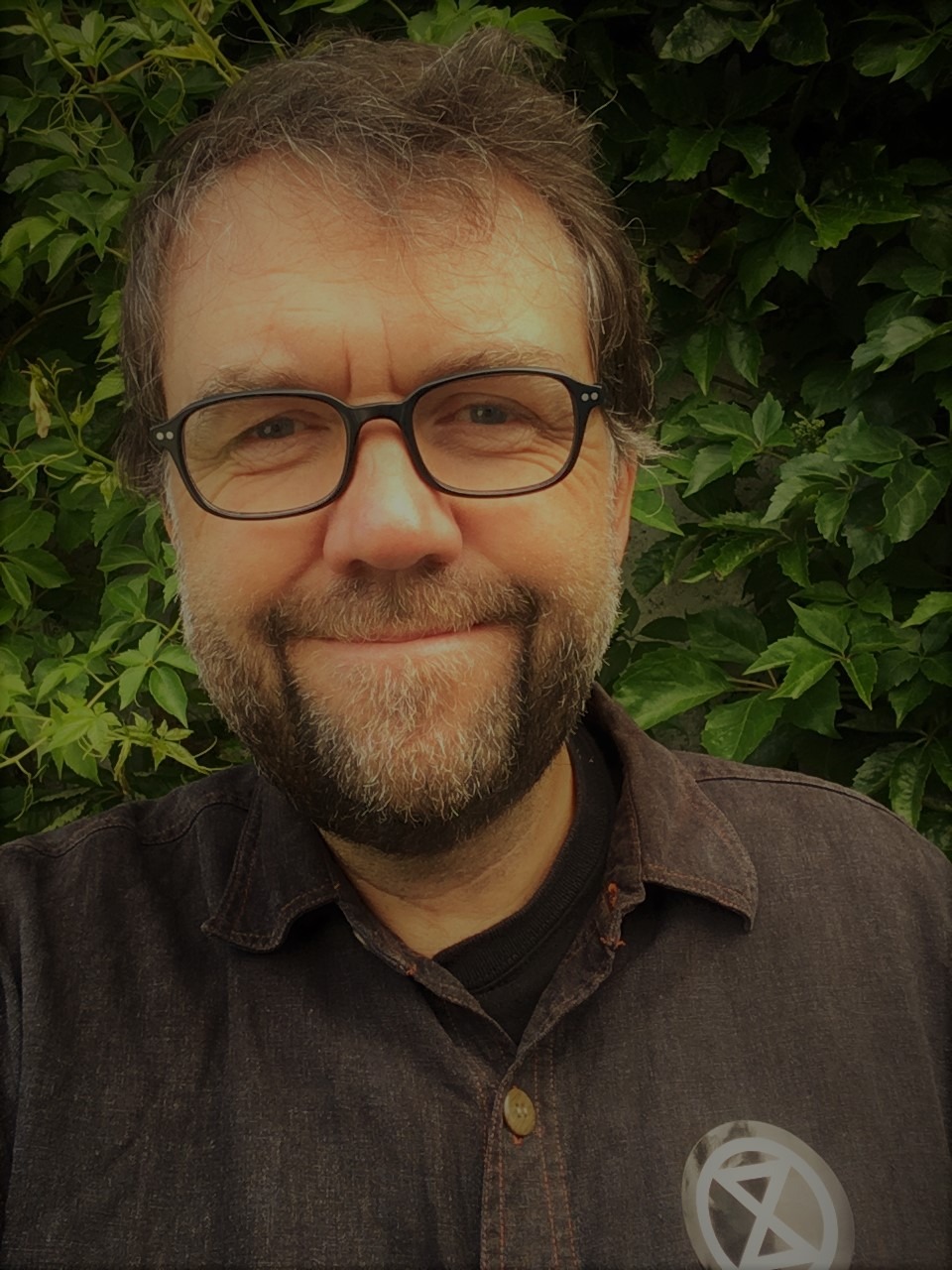
| Rydym yn hynod o falch i gael cyhoeddi taw ein trydydd pencampwr yw Nic Dafis – yn wreiddiol o’r Waun ger Wrecsam, ac sydd erbyn hyn yn byw yn Pontgarreg ger Llandysul. Mae Nic yn diwtor iaith gyda Dysgu Cymraeg i Oedolion trwy Prifysgol Aberystwyth, ac yn dysgu yn Aberteifi. Nid oedd Cymraeg ar aelwyd ei deulu yn Y Waun; y Cymry Cymraeg olaf oedd cenhedlaeth ei hen neiniau a theidiau. Nid tan iddo symud i fyw yng Nghaerdydd a chael swydd mewn siop lyfrau Cymraeg yn y ddinas benderfynodd Nic ddechrau meddwl o ddifri am ddysgu Cymraeg. Gyda chefnogaeth gref ei gyflogwr, mynychodd ddosbarthiadau “Wlpan” dan ofal Prifysgol Caerdydd, a dysgu’n gyflym: erbyn diwedd y tymor cyntaf roedd yn gallu ateb y ffôn, ac erbyn diwedd y flwyddyn, roedd yn gallu ymdopi â’r cwsmeriaid wyneb yn wyneb, yn lle llechu yng nghefn y siop yn dadbacio bocsys! Yn fuan ar ôl pasio’r arholiad “Canolradd”, symudodd Nic i fyw ger Llangrannog, ac yn fuan ar ôl hynny, ffeindiodd ei hunan yn dysgu dosbarth nos lefel Mynediad fel tiwtor. | We are very proud to announce that our third champion this year is Nic Dafis – originally from Chirk near Wrexham, and who now lives in Pontgarreg near Llandysul. Nic is a Welsh language tutor for adults, working through Aberystwyth University and teaching in Cardigan. Welsh was not spoken in his family home in Chirk, the last Welsh speaking ancestors were from the generation of his great-grandmothers and great-grandfathers. It wasn’t until he moved to Cardiff and started work in a Welsh book shop in the city that Nic decided to think seriously about learning Welsh. With the strong support of his employer, he attended “Wlpan” classes through Cardiff University, and learnt quickly: by the end of the first term he could answer the phone in work, and by the end of the first year, he could cope with interacting face to face with customers, rather than hiding in the back of the shop, unpacking boxes! Soon after finishing his “Canolradd” (intermediate) exam, Nic moved to west Wales, to live near Llangrannog, and soon after found himself teaching night ‘Mynediad’ (beginner) classes as a tutor. |
| Tua’r un amser, dechreuodd gadw blog ar morfablog.com (sef y blog cyntaf yn y Gymraeg), ac yn 2002, lansiodd y wefan drafod maes-e.com – roedd y cyfnod yna yn un prysur iawn: dyddiau cynnar “y We Gymraeg”. Ac mae’r gwaith ar-lein yn parhau wrth iddo ddarparu cylchlythyr ar-lein i ddysgwyr yn ardal Aberteifi, sydd yn cynnwys y blog dysgu.com. Mae hefyd wedi bod yn sianeli mwy o’i egni mewn i gyfrannu tuag at ymgyrchoedd Gwrthryfel Difodiant (Extinction Rebellion/ XR) dros y flwyddyn ddiwethaf, yn ceisio ‘Cymreigio’ y mudiad hinsawdd o du fewn, fel petai, a denu rhagor o Gymry Cymraeg at y mudiad. Fel yr esboniai: | At the same time, he began keeping a blog called morfablog.com (the first ever Welsh language blog in Welsh), and in 2002, he launched the discussion website maes-e.com. The online work continues as he currently provides an online newsletter to learners in the Cardigan area, which includes the blog dysgu.com. He is also channelling more of his energy into contributing to the Extinction Rebellion/ XR campaign. He works with others to make sure that the Welsh language is used within the climate movement, whilst also trying to attract more Welsh speakers to be a part it. As he goes on to explain: |
| “Mae gyda fi ddiddordeb arbennig mewn pontio rhwng y ddau fyd o ddysgu Cymraeg a bod yn weithredol yn yr ymgyrch i daclo’r Argyfwng Hinsawdd. Mae XR, fel mudiad rhyngwladol, wedi bod yn hapus iawn i gefnogi siaradwyr Cymraeg tu mewn i’r mudiad, ond rydym yn lleiafrif bach ar hyn o bryd, gyda llawer llai o bresenoldeb yn y mudiad nag sydd gyda ni ar lawr gwlad. Mae canran fwy o Gymry mewn grwpiau XR yn yr ardaloedd traddodiadol “di-Gymraeg” nag sydd yn y “Fro Gymraeg”, ac mae awydd mawr ‘da fi i ddarbwyllo rhagor o “Rebels XR” i fynd ati i ddysgu’r iaith ac yr un pryd i ddarbwyllo rhagor o siaradwyr Cymraeg bod lle iddyn nhw yn yr ymgyrch hinsawdd. | “I have a particular interest in bridging the two worlds of learning and teaching Welsh and being active in the campaign to tackle the Climate Emergency. Extinction Rebellion, as a global movement, have been more than happy to support Welsh speakers within its organisation, but we are a small minority at the moment, with much less presence within the organisation compared to that on the ground. There is a higher percentage of Welsh speakers in Extinction Rebellion groups in traditional ‘non-Welsh speaking areas’ than there are in the traditional Welsh speaking areas. I am eager to encourage more “XR Rebels” to learn the Welsh language and at the same time, persuade more Welsh speakers that they have a role to play in the climate campaign.” |
| Wrth esbonio pwysigrwydd Diwrnod Shwmae Sumae, meddai Nic: | Explaining the importance of Shwmae Sumae Day, Nic says: |
| “Rwy’n ei weld yn gyfle arbennig i hybu’r iaith Gymraeg yn ein cymunedau lleol, ac i ddathlu ein hiaith a diwylliant. Mae’n bwysig i gael y neges allan at “siaradwyr ansicr” y Gymraeg – pobl sy falle ddim yn cael cyfle bob dydd i ddefnyddio’r iaith – bod eu Cymraeg nhw yn wych, a bod rôl iddyn nhw yn yr ymdrech o gyrraedd Miliwn o Siaradwyr erbyn 2050. Fel rhywun sy wedi defnyddio llawn cymaint o Gymraeg ar-lein ag ydw i yn fy nghymuned leol “go iawn”, hoffwn i feddwl bod rôl gyda fi i drafod fy hanes yn y cyfryngau traddodiadol, ac i hybu’r Diwrnod trwy fy ffrydiau lu yn y cyfryngau cymdeithasol.” | “I see it as a very special opportunity to promote the Welsh language in our local communities, and to celebrate our language and culture. It’s really important to get a message through to those who might be uncertain about their proficiency in Welsh – maybe people who don’t have the opportunity to speak the language every day – that their Welsh is brilliant, and that they have a role to play in the effort to reach One Million Welsh Speakers by 2050. As someone who has used just as much Welsh online as I do in my surrounding community, I would like to think that I have a role to play in discussing my learning experience with others, and to promote the Day via the network of friends and contacts I have through social media.” |
Valerie Humphries
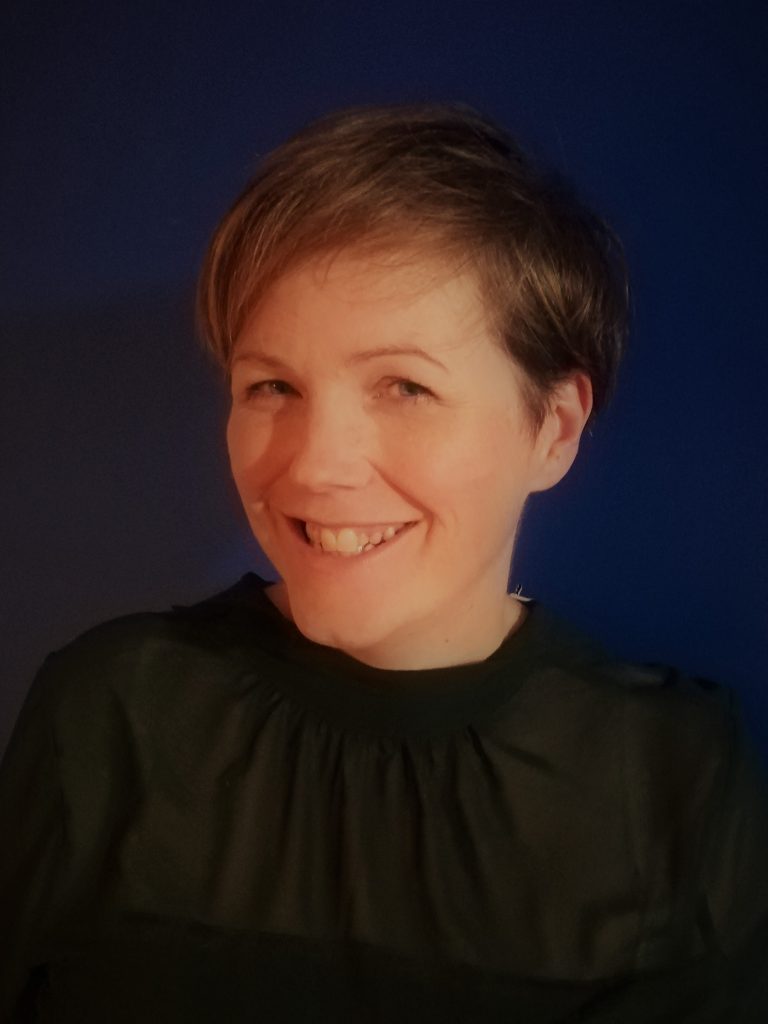
| Ein pedwaredd bencampwraig i’w chyhoeddi eleni yw Valerie Humphreys, yn enedigol o Iwerddon mae erbyn hyn yn byw a gweithio yng Nghaerfyrddin. Mae’n gweithio rhan amser yn Ysbyty Glangwili fel seingraffydd (yn neud sganiau uwchsain), yn fam i dri o blant ac wedi bod yn dechrau ar y daith o ddysgu Cymraeg ers i’w phlant ddechrau yn yr ysgol Gymraeg lleol. Credai bod ysgolion yn gallu chwarae rôl bwysig iawn i gyflwyno’r iaith i deuluoedd heb y Gymraeg, gyda’r capasati o ddangos faint o hwyl sydd bosib cael gyda’r iaith – dyma beth ddechreuodd ei theulu ar y daith. Meddai Val: | The fourth champion to be announced this year is Valerie Humphreys, originally from Ireland she now lives and works in Carmarthen. She works part-time in Glangwili Hospital as a sonographer and is a mother of three. She started her journey of learning Welsh when her children began attending the local Welsh medium school. She believes that schools have an important role to play in introducing the language to families without any Welsh language background – as they can show how much fun there is to have through the language. This is what started her and her family on their journey with Welsh. Val says: |
| “Dechreuais i ddysgu Cymraeg pan benderfynon ni i hala ein plant i Ysgol Cymraeg. Mae fy ngŵr yn dod o Iwerddon hefyd, felly doedd dim Cymraeg gyda ni yn y tŷ cyn hynny! Ond ro’n ni eisiau cefnogi ein plant gyda’u haddysg – darllen gyda nhw, helpu gyda gwaith cartre’ a hefyd i fod â’r gallu i gymryd rhan yn eu bywyd ysgol yn gyffredinol. Ro’n i’n dysgu Gwyddeleg a Ffrangeg pan o’n i’n yn yr ysgol, felly o’n i’n gobeithio byddwn i’n gallu dysgu Cymraeg yn ddigon hawdd hefyd! Roedd e’n anodd ar y dechrau, ond roedd y plant yn help mawr gyda fy nysgu, achos roeddwn i’n gallu ymarfer gyda nhw heb boeni! Fe wnaethon nhw fy nghywiro i gydag ynganiad a geirfa a phopeth! | “I began learning Welsh when we decided to send our children to the Welsh medium school. My husband is also from Ireland, so we had literally no Welsh in the home before then! But we wanted to support our children with their education – read with them, help with homework and also be able to take part in their school life in general. I learnt Irish and French when I was in school myself, so I was hoping that I could learn Welsh quite easily too! It was difficult at the beginning, but the children were a massive help with helping me learn, because I could practice with them, without worrying. They corrected my pronunciation and vocabulary and everything! |
| "Erbyn hyn, dwi’n mynd i wersi Cymraeg yn Yr Atom yng Nghaerfyrddin pob wythnos, a dwi’n joio mas draw dysgu gyda fy nhiwtor a chyd-ddisgyblion, a byddaf yn dechrau Cwrs Uwch eleni! Mae llawer o ffrindiau gyda fi sy’n siarad Cymraeg, ac mae’n hyfryd i gael bywyd cymdeithasol gyda nhw heb boeni am ddeall pethau. A be sy’n grêt yw does ddim rhaid iddyn nhw newid eu hiaith er fy mwyn i! Mae’r iaith yn fy helpu gyda gwaith hefyd. Dwi’n gweithio gyda phobl ifanc, ac weithiau dydyn nhw ddim yn siarad Saesneg o gwbl. Ond nawr fy mod i’n gallu siarad Cymraeg dwi’n gallu helpu nhw i deimlo yn fwy cyfforddus achos maen nhw’n gallu cyfathrebu yn eu hiaith nhw.” | "Now, I’m attending Welsh language lessons in ‘Yr Atom’ in Carmarthen every week, and I love learning with my tutor and classmates, and I will begin an Advanced course this year! I have a lot of friends that speak with me in Welsh, and it’s lovely to have a social life with them without worrying about understanding everything – and what’s great is that they don’t have to switch their language on my behalf! The Welsh language helps with my work too. I work with young people, and sometimes they don’t speak English at all. Now that I can speak Welsh, I can help them feel more comfortable because they can communicate in their own language.” |
| Wrth esbonio pwysigrwydd Diwrnod Shwmae Sumae a’i gyswllt â dysgu Cymraeg, meddai Val: | Explaining the importance of Shwmae Sumae Day and learning the Welsh language, Val says: |
| “Mae Diwrnod Shwmae Sumae yn helpu lot gyda hyder. Mae dechrau dim ond wrth ddweud Shwmae wrth bobl – heb bwysau – yn meddwl does dim byd gyda chi i golli! Mae e’n hawdd i’w wneud. Ffordd mewn yw e, i ymuno’r gymuned Cymraeg, a phan dych chi’n dechrau dysgu’r iaith dych chi’n sylweddoli pa mor groesawgar yw ei phobl a faint dych chi’n gallu ennill! Ydy, mae e’n cymryd ymdrech i ddysgu iaith. Llawer o amser, llawer o boeni, llawer o gamgymeriadau. Y peth caletach yw ffeindio’r hyder i siarad â phobl – a phoeni am sut dych chi’n swnio neu os dych chi’n neud camgymeriadau. Er y bydda i yn Lloegr ar Ddiwrnod Shwmae Sumae eleni, dwi’n gobeithio bydda i’n ddechrau pob sgwrs gyda Shwmae, a drwy hynny, dechrau sgwrs amdano’r iaith gyda phobl heb wybodaeth o Gymraeg. Pwy sy’n gwybod, efallai wnaiff rhywun arall ddechrau dysgu?” | “Starting a conversation by just saying Shwmae to people – with no pressure – means that you have nothing to lose! It’s simple to do. Shwmae Sumae helps a lot of people with confidence too. It’s a way in, a way of joining the Welsh speaking community, and if you go on to learn Welsh you soon learn how welcoming the people of that community are and how much you can gain by being a part of it. Yes, it takes effort to learn a language. A lot of time, a lot of worrying, many mistakes. The most difficult thing is finding the confidence to speak with people – and worrying how you sound or if you’re making mistakes. Although I will be in England on Shwmae Sumae Day this year, I hope to start my interactions with a Shwmae, and by doing so, start a conversation about the language with people that have no knowledge of Welsh. You never know, maybe someone else can be inspired to learn!” |
Dan McCallum
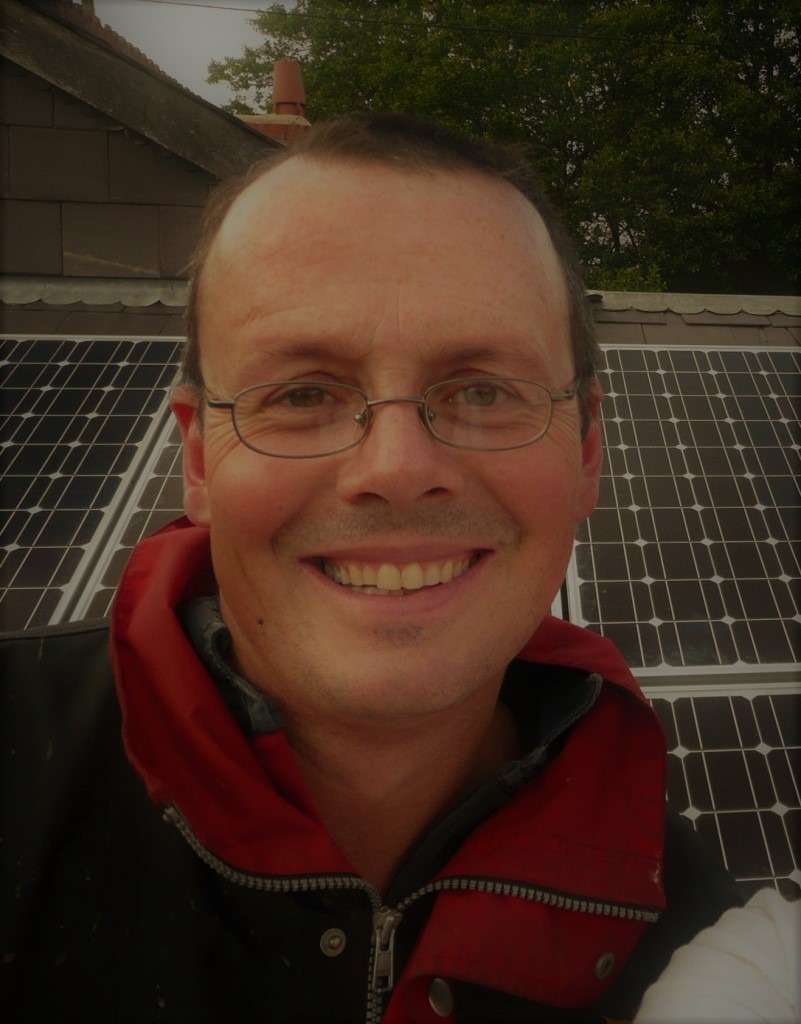
| Ein pumed pencampwr, a’r pencampwr olaf i gael ei gyhoeddi go gyfer Diwrnod Shwmae Sumae 2019 yw Dan McCallum o Tairgwaith ger Rhydaman, sydd yn dod yn wreiddiol o Aberplym (Plymouth). Gweithiodd gynt fel Rheolwr Oxfam yn Kurdistan, Gogledd Irac; fel Rheolwr Rhaglen Grŵp Hawliau Lleiafrifoedd Affrica a’r Dwyrain Canol; ac fel athro gyda ffoaduriaid Eritreaidd yn Sudan. Ers symud i Gymru ugain mlynedd yn ôl, a dechrau ar ei daith o ddysgu Cymraeg, mae Dan erbyn hyn yn rheolwr Awel Aman Tawe, elusen sy’n ymwneud â phrosiectau ynni adnewyddadwy, effeithlonrwydd ynni ac amgylcheddol yng Nghymru. Mae’n gyfarwyddwr i Grŵp Cydweithredol Awel sydd wedi datblygu fferm wynt cymunedol ar Fynydd y Gwrhyd, i’r gogledd o Abertawe. Mae hefyd yn gyfarwyddwr ar fwrdd Grŵp Cydweithredol Egni Solar, sydd wedi bod yn gosod paneli solar ar adeiladau cymunedol ac ysgolion ers 2015, ac sydd yn gweithio nawr ar brosiect i osod hyd at 5MW o solar to ar draws Cymru. Mae ei wraig Emily, bardd ac artist, hefyd wedi dysgu Cymraeg, a buodd ei merched yn mynychu’r ysgol Gymraeg lleol. Wrth esbonio pwysigrwydd y Gymraeg iddo, a’i brofiad o ddysgu, meddai Dan: | Our fifth and final champion to be announced this year is Dan McCallum from Tairgwaith near Ammanford. Originally from Plymouth, he has worked as a Manager for Oxfam in Kurdistan, Northern Iraq; as a Manager for the Programme for Minority Rights Group in Africa and the Middle East; and as a teacher for Eritrean refugees in Sudan. Since moving to Wales twenty years ago, and starting on his journey of learning Welsh, Dan is now the manager of Awel Aman Tawe, a charity that works on developing renewable energy, energy conservation and environmental programmes in Wales. He is a director for Awel Coop which has developed a community wind farm on Gwrhyd Mountain to the north of Swansea. He is also a director for Egni Solar Coop, a project that has been placing solar panels on community buildings and schools since 2015, and who are currently working on a project to place 5MW of roof solar across Wales. Dan’s wife, poet and artist, Emily Hinshelwood has also learnt Welsh, and both daughters have attended the local Welsh medium school. Explaining the importance of the Welsh language, and his experience of learning, Dan says: |
| “Mae’r Gymraeg yn bwysig i mi, oherwydd mae fy ngwaith i yn digwydd o fewn y gymuned leol a llu o gymunedau eraill yng Nghymru, a’r Gymraeg yw iaith naturiol llawer o’r bobol rwy’n gweithio gyda. Fel profais gyda fy ngwaith rhyngwladol cyn dod i fyw yng Nghymru, mae gallu deall iaith, bod yn barchus ohoni ac o’i siaradwyr ac o’i hanes a’i gysylltiadau diwylliannol, yn hanfodol, os ydych chi am gydweithio gyda chymunedau. | “The Welsh language is important to me because my work takes place within the local community and a number of other communities across Wales, where the Welsh language is the natural language of many people that I work with. As I experienced with my international work before coming to Wales, the ability to understand a language, be respectful of it and its speakers and of its history and cultural ties is essential, if you want to work with communities. |
| "Ers dysgu Cymraeg, dwi wedi neud sawl cyflwyniad yn y Gymraeg, a chyfathrebu yn y Gymraeg yn naturiol. Mae hyn yn bwysig i mi, ac rwy’n gallu teimlo’n falch o fy hun, fy mod i nawr yn gallu cyfri fy hun yn siaradwr Cymraeg! Wy’n mwnau hefyd siarad â fy ewythr a fy nheulu o Fetws, Rhydaman ble mae fy mam yn dod o yn wreiddiol. Cymraeg oedd ei iaith cynta’ hi a’i hochr hi o’r teulu – felly roedd fy ewythr yn hapus iawn fy mod i wedi dysgu Cymraeg, a reit o’r dechrau, newidiodd e i siarad dim ond Cymraeg da fi. Mae llawer o bobl yng Nghwmllynfell ble wy’n gweithio yn siaradwyr Cymraeg, fel Mark y Cigydd sy’n helpu fi i siarad yn y Gymraeg!” | "Since learning Welsh, I have made many presentations in Welsh, and communicate in Welsh naturally. This is really important for me, and I can feel pride in myself that I can now count myself as a Welsh speaker! I also enjoy speaking with my uncle and my family from Betws, Ammanford where my mother is originally from. Welsh was her first language and her whole side of the family – so my uncle was really happy that I have learnt Welsh, and right from the very beginning, he switched to speaking only in Welsh with me. There are many people in Cwmllynfell where I work, who are Welsh speakers, like Mark the Butcher, who helps me to speak in Welsh!” |
| Ar Ddiwrnod Shwmae Sumae eleni, mi fydd Dan yn tywys grŵp o ddisgyblion o Gasnewydd o gwmpas y tyrbin gwynt cymunedol ar Fynydd y Gwrhyd, ac yn gobeithio bydd bosib anfon neges arbennig o brosiect celf diweddar Egni Coop, sydd yn codi ymwybyddiaeth o newid hinsawdd drwy anfon artist lleol i’r lleuad! Disgwyliwn ymlaen i gael Shwmae a Sumae o’r gofod eleni! | On Shwmae Sumae Day this year, Dan will be leading a group of pupils from Newport around the community wind turbine on Mynydd y Gwrhyd, and also hopes to send a special message from Egni Coops current art project which is raising awareness about climate change by sending a local artist to the moon! We look forward to receiving an interstellar Shwmae and Sumae this year! |

